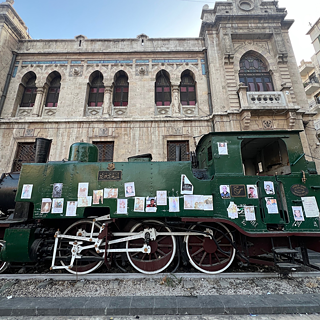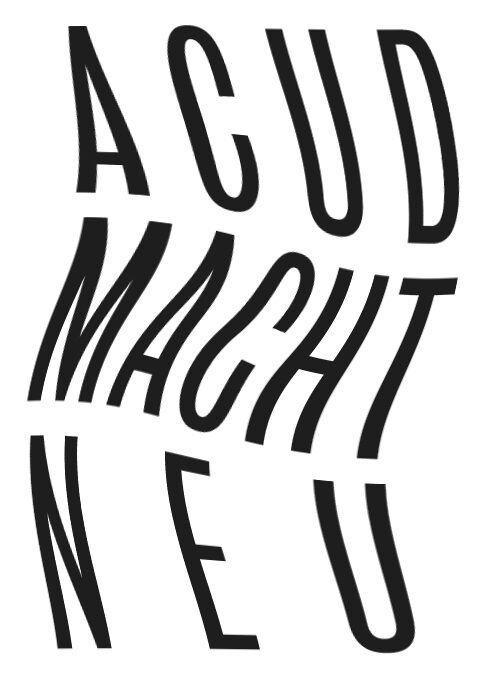|
7:00 PM
Syria: Quo Vadis?
Talking event|Literary Perspectives on Memory, Transition, and the Future
-
ACUD Club, Berlin
- Language English, Arabic
- Price free entrance
- Part of series: Syria: Quo Vadis?

In 2016, the Goethe-Institut hosted “Goethe-Institut Damascus in Exile”, a festival that highlighted the work of Syrian cultural practitioners living in exile. Many of the artists and cultural figures invited back then have since established themselves in new lives. Memories that were fresh at the time have often faded, only to be stirred again by recent developments. Nine years later, Syrians are experiencing not just a sense of upheaval and euphoria but also uncertainty about whether it will be possible to build a stable future.
At the same time, shocking remarks from some German politicians calling for the immediate return of Syrian refugees underscore how extreme positions are increasingly stepping out of the realm of the unspeakable.
In light of these developments, the Goethe-Institut in Exile, in collaboration with long-time and new partners from the Syrian diaspora, invites you to the start of a series of events focussing on Syria. Building on the conversations initiated in 2016 and the years that followed, this event will delve into the challenges, opportunities, and visions for the future that Syrian artists and writers are grappling with in this pivotal moment.
Programme
19:00 – 20:15 | “The Syria I Lost, The Syria That Finds Us”: A Report from DamascusAhmad Katlesh in conversation with Sandra Hetzl
Ahmad Katlesh is a Syrian writer, journalist, and podcaster whose journey has been closely followed by the Goethe-Institut in Exile. Between December 2024 and January 2025, after twelve years away, he returned to Syria as one of the first intellectuals of his generation to make such a journey. Katlesh will present an exclusive account of his visit to his hometown of Damascus, capturing the moods, perspectives, and hopes of a country in transition.
20:30 – 22:00 | “Echoes of Return – Old Homeland, Foreign Land”
Reading and Conversation
With Dima Wannous, Rosa Yassin Hassan, Inana Othman
Moderation: Yasmin Merei | Musical Accompaniment: Ali Hasan
In a reading and discussion, renowned Syrian exile authors Dima Wannous (*1982 in Damascus, living in London), Rosa Yassin Hassan (*1974 in Damascus, living in Hamburg), and Inana Othman (*in Hasaka, living in Berlin) explore themes such as the loss of home, identity, deeply rooted fear, and newfound hope for freedom. After years of stagnation in Syria, events are now rapidly unfolding. The unexpected change in the old homeland disrupts the sense of time and raises many questions. What role do personal and collective memories play in the diaspora? How do they shape writing, and what future narratives can be imagined? The conversation will be moderated by journalist and literary scholar Yasmin Merei.
Guests
Ali Hasan is a Berlin-based musician, percussionist, educator, and healing artist with Syrian roots. Renowned for his dynamic rhythms, he performs solo or with groups like Pulsar Collective and Dabke Community Dance by Sasha Waltz & Guests. As certified physical therapist from the Akademie der Gesundheit Berlin/Brandenburg e. V., Ali integrates his therapeutic expertise into his artistry.
As the co-founder and Art Curator of BAYNATNA, the first Arabic Library in Berlin, he fosters Arabic and international arts, earning accolades like “The Power of the Arts 2020”. He also curates and performs with the Resident Music Collective at the Humboldt Forum.
Widely recognized in Europe and international press, Ali Hasan tours extensively and serves as a guest instructor at Berlin University of the Arts (UdK) in Winter 2024/2025.
Rosa Yassin Hassan, born in Damascus in 1974, is an author and women’s rights activist. She initially studied architecture in Syria. Since 2002, she has published seven award-winning books, which have been translated into several languages. Her novels “Ebenholz” (Alawi Verlag, 2010) and “Wächter der Lüfte” (Alawi Verlag, 2012) have been published in German. Rosa Yassin Hassan has written numerous articles on cultural and political topics that have been published in Arabic, German and international newspapers and magazines. She was a founding member of the association “Women for Democracy” and has been a member of the German PEN Club since 2015. After the Syrian revolution, she came to Germany with her son at the end of 2012.
Sandra Hetzl (*1980 in Munich) writes and translates contemporary Arabic literature, for example works by Haytham El Wardany, Rasha Abbas, Kadhem Khanjar, Aboud Saeed, Bushra al-Maqtari, Aref Hamza and Assaf Alassaf. In addition to poetry and prose, she has translated over two dozen plays into German, including works by Mohammad Al Attar, Mudar Alhaggi, Wael Kaddour and Rabie Mroué. She is founder of teneleven.org, an agency and collective for contemporary Arabic literature.
Ahmad Katlesh is a writer. He was born in Damascus in 1988 and studied mathematics there. After the Syrian revolution, he fled to Jordan in 2013 and worked there as a journalist. He came to Germany in 2016 with the aid of a scholarship from the Heinrich-Böll-Haus. He has published three books with short stories and poems in Arabic. His first book in German, the poetry collection “Das Gedächtnis der Finger”, was published in 2020. Therefor the Bayerische Akademie der Schönen Künste awarded him with the Chamisso-Publikationsstipendium. He also reads literary texts for millions of Arabic-speaking listeners on the literary platform Tiklam.
Yasmin Merei, born in Homs, Syria, in 1984, is a journalist, women’s rights advocate, and expert in communication, civic education, and leadership training, passionate about social equality and empowering marginalized groups. From 2013 to 2016, she was the editor-in-chief of Saiedet Souria, a women’s magazine, and co-founded the Forum for Knowledge and Freedom of Expression in Turkey, a landmark Syrian dialogue initiative in exile.
In 2015, she received the Feuchtwanger Fellowship at Villa Aurora, Los Angeles, and collaborated with Sasha Waltz & Guests until 2018 through support from Allianz Foundation.
Since 2020, Yasmin has focused on Women for Common Spaces, a Berlin-based project she founded to preserve the memory of female exiles and to train young refugee women in leadership. She also works as a media and advocacy consultant, holds degrees in Arabic Literature and Linguistics, and is pursuing a Master’s in International Relations at École supérieure de journalisme de Paris.
Inana Othman was born in 1990 in Hasaka and lives in Berlin. She translates, writes poetry, and creates documentary essays. Her works have been featured at various literary festivals, in the Pavilion Hannover, at HKW Berlin, and at the Hessian State Theatre Marburg, and have been published in multilingual literary journals such as Untoldmag, Edit, and inamo. Recent publications include “Das Vermisste ist dessen Markierung” in die horen, Vol. 293, 69th Year, Wallstein Verlag, March 2024; "Kan yama kan" in “Stoff aus Luft”: BELLA triste No. 66, Fall 2023; and “vorwärts Erinnern” in “Vergangenheit vorhersagen”: Schauspiel Düsseldorf, Summer 2022. In 2023, Inana received the SchreibZeit scholarship from the Niedersachsen Foundation.
Dima Wannous, born in Damascus in 1982, is a distinguished novelist and journalist.
After the onset of the Syrian revolution, Dima faced imminent threats of death and arrest, prompting her to relocate to Beirut, where she resided for six years. In Beirut, she established herself as a prominent journalist and TV anchor, working for the esteemed Al-Safir newspaper and hosting a weekly television program on Orient, a Syrian opposition channel. Her show featured interviews with key Arab and international political and intellectual figures.
During her time in Beirut, Dima wrote her critically acclaimed second novel “The Frightened Ones”, which was shortlisted for the International Prize for Arabic Fiction, commonly referred to as the Arabic Booker Prize. The novel has been translated into several languages, including English, French, Italian and Dutch. It was published in German under the title “Die Verängstigten” (2018, translated by Larissa Bender, Karl Blessing Verlag).
Since 2017, Dima has been based in London, continuing her work in journalism and television. Her literary contributions include her third novel, “And the Family Devoured Its Men”, which has been translated into Portuguese.
Dima Wannous’s illustrious career and influential voice in both literature and media underscore her significant impact on contemporary Arabic culture and thought.

